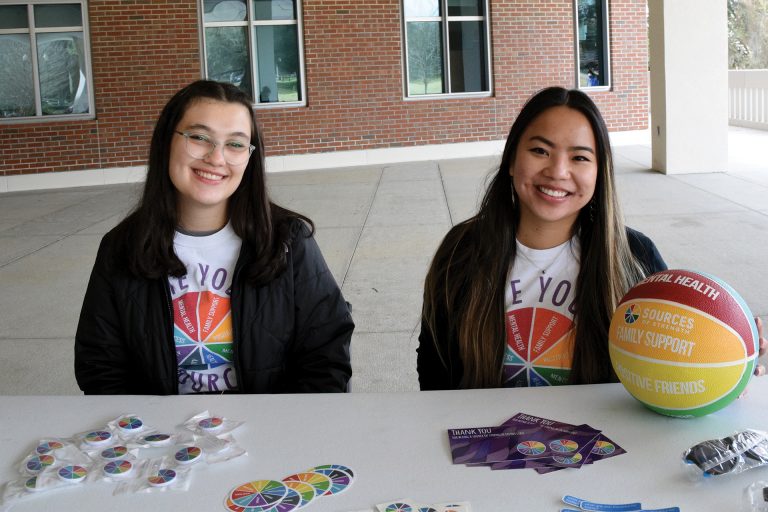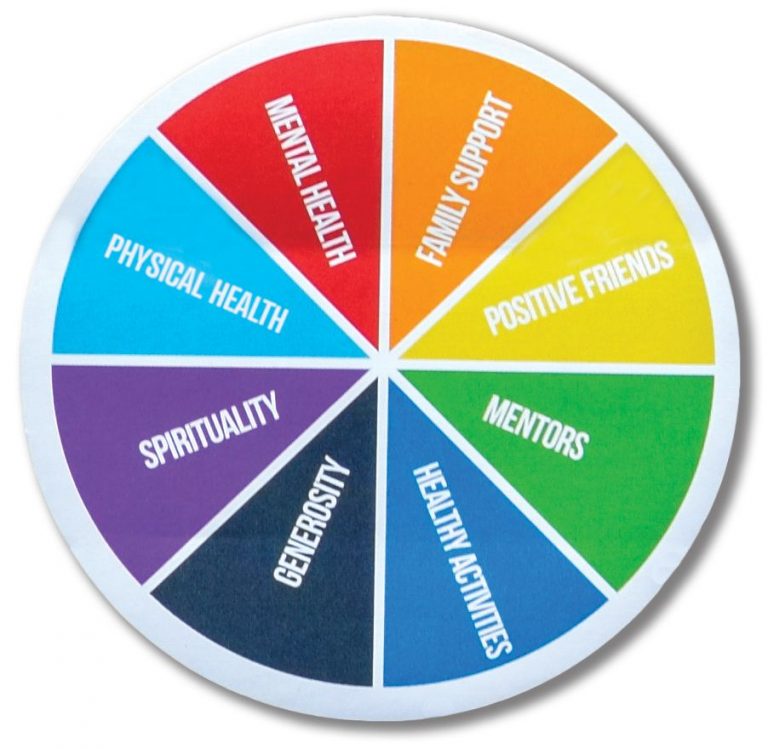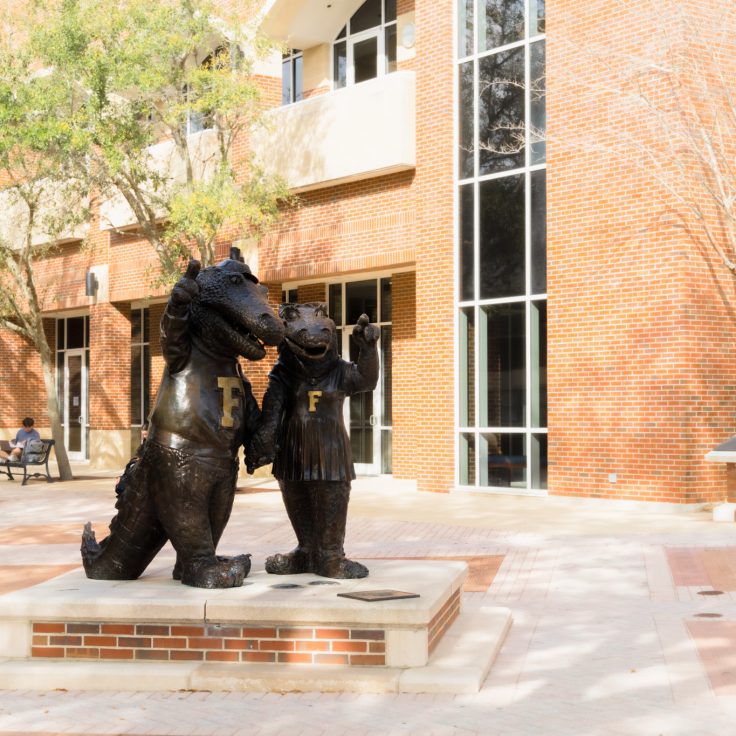
How Peer Support is Breaking Stigma Around Mental Health and Wellness
Backed by college faculty and alumni, students are working to build a more compassionate culture on campus
In Japan, kintsugi pottery involves mending broken ceramics by repairing them with gold lacquer, allowing the fault lines, brazen in the shimmering color, to stand out. The broken places become badges of honor to celebrate, not cover up in shame. The artisans who repair these objects believe they become even more beautiful because they’ve been chipped and cracked. What could have been perceived as weakness is transformed into strength.
Like kintsugi artisans, student mental health activists at UF are working to change the stigma around vulnerability. One student organization, Sources of Strength, uses the power of positive psychology to shift the conversation.
“We focus on what gives people strength and how we can help people grow in these strengths to become even stronger — looking at what people have going for them instead of what’s wrong,” third-year student Mailys Angibaud said.
Angibaud, who became involved with Sources of Strength her freshman year, plans for a career in counseling psychology to put the preventative approaches she’s learned into further action. “So much about mental health awareness is focused on late-stage intervention,” the triple-major honors student said. “It’s so dangerous to wait until that time comes.”

College is often a time of newfound freedom. When the COVID-19 pandemic began, however, many students had to swap that autonomy for confined boxes on Zoom and socially distanced markers on the ground. COVID short-circuited what were once core pieces of the college experience.
Nationwide, the situation intensified already increasing rates of mental health struggles. The U.S. Surgeon General sounded the alarm by issuing an advisory in December 2021, elevating youth mental health as a crisis in our country, noting the need for resources and attention on this matter as “dire.”
Your mental wellness underpins everything — your ability to concentrate, build healthy social relationships, juggle multiple responsibilities. … Now is the time to build that foundation.
— Lisa Sontag-Padilla (Psychology PhD ’09)
Since graduating from the UF College of Liberal Arts and Sciences, Lisa Sontag-Padilla (Psychology PhD ’09), behavioral and social scientist at the RAND Corporation, has done extensive research on student mental health in college settings. “Your mental wellness underpins everything — your ability to concentrate, build healthy social relationships, juggle multiple responsibilities,” she said. “All of these things are important as a student and as an adult in general. Now is the time to build that foundation.”
The changing times have spurred conversation in ways we’ve never seen before. And according to a recent national survey by the Healthy Minds Network, a mental health research organization, Gen Z is more willing to speak up about their mental health. Sontag-Padilla says she’s observed a cultural shift among younger generations.
“From my experiences with a variety of institutions, I’m seeing an openness to talking about mental health and to feeling empowered to seek out help,” she said. “However, I think we’re still in the early phases of thinking about what prevention looks like and integrating it into our vocabulary — not waiting until things are in dire straits.”
When Simone Biles catapulted self-care into the limelight during the Tokyo Olympic Games held in 2021, she shared a piece of crucial advice: “Put mental health first.” Going back to 2018, UF and college leaders have come together to try to do just that. A peer-focused program offered a possible key — who better to understand the needs of students than other students?
A superstar alumna joined the cause. Kathy Fields (Neurobiological Chemistry ’79), co-creator of the Proactiv and Rodan + Fields skincare empire, provided significant support to the Department of Psychology to launch Sources of Strength at UF. A Sources of Strength Leadership course, approved for Fall 2018 and Spring 2019 terms, provided a platform to disseminate the program and provide training in prevention science.
After taking the course that fall, students built upon the momentum and established Sources of Strength as a student organization. “Students craved a sustainable program where they could continue their outreach to help other students build their resilience and understand the resources available to them — not just at UF and around Gainesville, but within themselves,” said Julia Graber, professor and chair of the Department of Psychology.
Graber serves as Sources of Strength’s faculty advisor. As an expert on young adult development, she provides guidance by offering her own insights as a researcher to inform the group’s initiatives.

Sources of Strength’s model itself is rooted in prevention science, featuring eight core protective factors: family support, positive friends, mentors, healthy activities, generosity, spirituality, mental health and physical health. Nationally, members of the group promote these key aspects of wellness, which can ultimately bolster mental health and lead to decreased suicidal ideation. The program evolved into the university landscape from a middle and high school model — so it’s intentional about not putting the pressure on students to try to “save” their classmates, instead encouraging them to act as helpful connectors.
We’re trying to prevent self-destructive thoughts or habits before they even begin to manifest in people’s lives.
— Delaney Phelps, UF Sources of Strength President
As the Counseling and Wellness Center manages the ever-increasing demand for their services, the need to address situations before they escalate to crisis becomes even more critical.
“We’re trying to prevent self-destructive thoughts or habits before they even begin to manifest in people’s lives,” fourth-year student Delaney Phelps said.
Phelps became the president of UF’s Sources of Strength chapter the semester that COVID hit. The group shifted gears to keep students connected after the pandemic sent them home, hosting virtual events. But no matter the format, the group gives members freedom to brainstorm initiatives themselves.
“The heart of our organization is student-led,” Phelps said. “We don’t want to be a group telling students what to do — we want to take what students feel and want and run with those ideas.”
America El Sheikh, the program’s graduate student coordinator, helped launch Sources of Strength at UF. She’s energized by the ways the students involved have grown into passionate mental health advocates. “They find engaging, creative ways to talk about mental health,” she said. “During the pandemic, we did this great pick-your-own-adventure virtual workshop where you could decide what you needed in the moment — guided meditation, journaling, a game of charades — and hosted breakout rooms for each activity.”

The group has worked to spread their message of optimism at tabling events and workshops. They’ve hosted guided painting sessions, led sunset yoga in the Plaza of the Americas and offered free hot chocolate in the winter months. “We table to spread our message, but also to help relax people and give them a fun activity to reduce stress. They may seem like small things, but they have the potential to make someone’s day,” Angibaud said.
A series of stickers with missives such as “What are you thankful for today?” have extended their reach. “Every time a student puts one on their laptop or water bottle, there’s something positive reminding them — and those around them — that they have options for support,” Phelps said.
Campus climate matters. Sontag-Padilla, the behavioral and social scientist and alumna, stresses the importance of elevating the presence of entities on campus that prioritize student mental health. She says it’s key for UF to communicate to each student that “your mental well-being — not just whether or not you’re experiencing suicidal ideation, not just whether or not you’re on the brink of dropout — your mental well-being matters to us and we want you to know that.”
While administrators chart a path forward, students are acting to improve care and address culture gaps. Sources of Strength isn’t the only space for students to join the mental health conversation on campus: UF’s chapter of Active Minds also takes a peer-to-peer approach to encourage others to seek help for mental health issues. The National Alliance on Mental Illness (NAMI) Gators club seeks to stomp out stigma with grassroots efforts to increase awareness.
Meanwhile, a new initiative is building on the momentum of the peer-to-peer model: Gator-2-Gator connects students individually with trained volunteer student ambassadors. And in summer 2020, the Counseling and Wellness Center expanded the conversation by launching a podcast devoted to conversations around mental health and wellness. There’s even a student organization called Take a Break and Bake that uses group baking activities to promote positive mental health.
Recent research suggests that these peer-led efforts have already made a difference. In 2018, Sontag-Padilla led a RAND Corporation study to determine the impact of the Active Minds peer mental health organization, surveying students across 12 colleges and universities in California. The study, among the first of its kind, found that simply being familiar with Active Minds predicted reduced stigma and increased knowledge and positive attitudes about mental health. Additionally, as students became more involved with Active Minds, they were more likely to reach out to a classmate or friend who was struggling with a mental health issue.
While Sontag-Padilla had expected to find that efforts of the peer organization were helping, she was floored by the results showing clear and distinct improvements in a single academic year.
“The fact that we were seeing these changes in one year, that was so exciting to see — it really supports and enforces what these groups are doing,” she said.
Sontag-Padilla hopes to see intentional conversations surrounding mental health pick up steam across campuses nationwide. “We go to the doctor and get our annual screenings so that we don’t miss opportunities to catch risks to our physical health early on — mental health should be treated the same way,” she said.
Faculty are key to ensuring the climate on campus feels supportive. Graber, the psychology chair, is part of a group of faculty partnering across multiple colleges and offices to take an audit of every effort currently happening related to student mental health and well-being. Their hope is to identify gaps and then fill them.
“It’s hard to know in an environment this big — are you getting out to all the students who might have needs?” she said. “How do you know when someone’s lost in the shuffle?”

They hope to create an environment where every UF student develops a sense of belonging, without losing sight of the individuals. “The goal is to have a particular community group within UF that provides immediate support for each individual, tailored to their individual needs,” Graber said.
Sontag-Padilla encourages campus leaders to seize the moment by raising awareness, evaluating needs and investing in long-term solutions. “You can’t program your way out of this student mental health crisis,” she said. “Without this prevention piece, we’re going to be in the exact same place for the next 10 to 15 years — something must change in that way of thinking.”
Sontag-Padilla is heartened by the work she’s seen emerging at UF to build a healthier and happier student body long-term. As a Gator herself, she understands the power in it. “There’s something special about UF, the identity that it creates for its students and what it means to be a Gator — you carry that with you,” Sontag-Padilla said. “The fact that UF is prioritizing this work and is willing to take a hard look at what’s been working and not working really shows how much the institution values student well-being.”
Bringing students to the table will be critical, she said. They offer first-hand expertise that should be central to the decision-making process. Sontag-Padilla also advises institutions to take a closer look at how mental health and wellness factor into student success.
“It’s about creating a foundation for your students so they can thrive while they’re a student and beyond — not just making sure they graduate and go on to get a good job,” she said.
Seeking resources to enhance your mental or physical health or know someone who may need some support? Check out on-campus and off-campus resources compiled by Sources of Strength here.
This story appears in the spring 2022 issue of Ytori Magazine. Read more from the issue.


